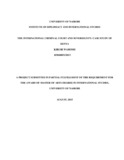| dc.description.abstract | With the Treaty of Westphalia (1648), the notion of sovereignty was born creating the international state system. The rise of international law however, put sovereignty under increased pressure. While significant work exists on sovereignty and international criminal law, the implications of trying a sitting head of state by the ICC has not been explored. The purpose of the study was to evaluate the role of sovereignty and nationalism on ICC‟s operations and court‟s ability to try sitting heads of states. This was prompted by the submission of the Kenyan president to the ICC on 8, November 2014. He became the first sitting head of state to do so with undeniable upshots for sovereignty.
The study is significant because it analyzes the role of sovereignty and nationalism on international criminal justice and the changing nature of sovereignty vis-à-vis dependent/developing nations of Africa and elsewhere. The study used Case Study research design and is Exploratory in nature. It utilized both qualitative and quantitative data collected through in-depth interviews and questionnaires. The study focused on Kenya and drew a sample from its cosmopolitan capital, Nairobi.
The findings of the study showed that sovereignty and nationalism play a big role in the day to day operations of the ICC. The court takes up some cases and not others and succeeds in some and not others due to states‟ activities. The study found that while nations in Africa consider themselves independent and sovereign, they‟re really not true sovereign states. This is because they are prone and susceptible to major powers and former colonial master‟s influences.
The study found that that while ICC‟s intentions are noble, its sole emphasis on African situations has created tension with the AU. Nationalism and Pan-Africanist rhetoric in the continent has led to calls to reform the court. Future studies in this area will focus on Africa‟s ability to offer domestic and continental wide justice and peace through homegrown institutions, The African Court of Justice and Human Rights being notable here. Ultimately, this study augments understanding of ICC‟s quest of forestalling grave violations of international criminal law vis-à-vis sovereignty and nationalism. | en_US |



